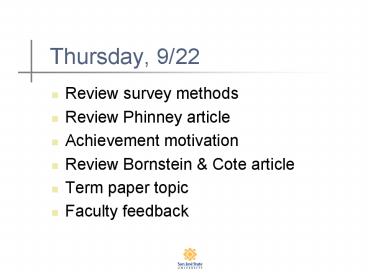Thursday, 922 - PowerPoint PPT Presentation
1 / 18
Title:
Thursday, 922
Description:
Review Bornstein & Cote article. Term paper topic. Faculty feedback. Survey construction ... Bornstein & Cote. Cognitions- internally held beliefs. Anglo ... – PowerPoint PPT presentation
Number of Views:31
Avg rating:3.0/5.0
Title: Thursday, 922
1
Thursday, 9/22
- Review survey methods
- Review Phinney article
- Achievement motivation
- Review Bornstein Cote article
- Term paper topic
- Faculty feedback
2
Survey construction
Survey or interview questions
Construct
operationalization
Construct- an abstract or general idea inferred
or derived from specific instances Operationalize-
take a general idea and turn it into specific
instances Example want to assess levels of
happiness
3
Happiness survey scoring guide
- 35 - 31 Extremely satisfied
- 26 - 30 Satisfied
- 21 - 25 Slightly satisfied
- 20 Neutral
- 15 - 19 Slightly dissatisfied
- 10 - 14 Dissatisfied
- 5 - 9 Extremely dissatisfied
4
Literature review / introduction
- Why was this study conducted?
- Why did the author consider it important?
- What were the primary research questions?
5
Methods
- What were the primary research methods used to
investigate the study questions?
6
Results / discussion
- What were the major findings from this study?
- What are the broader implications of this study?
- Dissonant acculturation theory
7
Achievement
- Concerns the development of motives,
capabilities, interests, and behavior that have
to do with performance in evaluative situations
8
Achievement motives and beliefs
- Need for achievement- the extent to which people
strive for success - Separate from ability
- An intrinsically motivated desire
- In general, higher need for achievement predicts
greater levels of achievement - Can be domain specific
- Beliefs about ability influence achievement
9
Intrinsic versus extrinsic motivation
- Intrinsic- motivation comes from within the
individual - Strive to achieve because of the pleasure they
get out of learning and mastering the material - Competent individuals
- Extrinsic- motivation comes from outside the
individual - Strive to achieve because of rewards or fear of
punishments - Less competent individuals
10
Achievement attributions
- The way in which students interpret their
successes and failures - Internal factors (ability and effort)
- External factors (task difficulty or luck)
- Good students attribute success and failure to
effort - Learned helplessness- the belief that ones
effort doesnt make a difference
11
Achievement motivation in context
- Familys role
- Degree of need for achievement
- Foster intrinsic or extrinsic motivations
- Cultural capital
- Friends role
- Role of socioeconomic status
- Parental education
- Access to cultural and social capital
12
Ethnic differences in academic achievement
- African-Americans and Hispanic-Americans almost
always lag behind White students, who lag behind
Asian-American students - Why?
13
Ethnic differences in academic achievement
- Socioeconomic status
- Study skills and study habits
- Ethnic group differences about ability
14
Bornstein Cote
- Cognitions- internally held beliefs
- Anglo-conformity theory of acculturation
15
Bornstein Cote cont
- We see that beliefs about ability do vary by
ethnic group and also by immigration status - Mothers beliefs are determined in part by their
culture of origin and by how long they have been
in US - The longer they are in the US, the more they look
like US
16
Maternal attributions
- Japanese mothers
- Success- internal (effort) attributions
- Failure- internal (effort) attributions
- Japanese-American mothers
- Success- internal (effort) attributions
- Failure- external attributions
- Argentinean mothers
- Success- internal (effort) attributions
- Failure- internal (effort) attributions
- Argentinean-American mothers
- Success- internal (effort) attributions
- Failure- external attributions
- Caucasian mothers
- Success- internal (effort) attributions
- Failure- external attributions
17
Maternal attributions cont
- While Japanese-Americans come to resemble
Caucasian mothers, they are still resemble
Japanese mothers more - Argentinean-American mothers much more closely
resemble Caucasian mothers - Confirms what we were talking about before
- Asians and Asian-Americans are more likely to
attribute success and failure to effort than to
external factors, which causes them to work
harder - However the longer they are in the US, the more
their attributions begin to look like Caucasians
18
Term paper topic due 9/29
- One-two paragraphs long
- What are the two ethnic groups, cultures, races,
etc that you plan to compare? - Chinese
- African-Americans
- Jews in America
- What issue do you plan to compare these groups
on? - Achievement motivation
- Parenting styles
- Media portrayals
- Why are you interested in these groups?
- Why are you interested in this topic?































